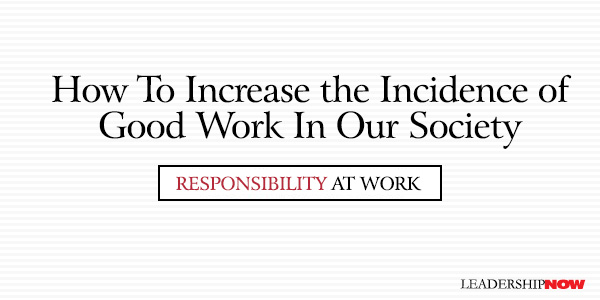 |
 |
08.17.07

How To Increase the Incidence of Good Work In Our Society
Ever since Adam and Eve were expelled from the Garden of Eden, human beings have had to work “by the sweat of our brows.” For most of human prehistory and much of recorded history, work has not been an activity on which we have had much perspective. Howard Gardner continues, “If we are to have a society that is open and fair, individuals must willingly, even energetically, be prepared to carry out crucial actions—ones required for the achievement and maintenance of such a society.” This sets the stage for his book, Responsibility at Work. The book of basically a collection of reports on the GoodWork® Project. Began in 1994 by Mihaly Csikszentmihalyi, William Damon, and Howard Gardner, the GoodWork® Project seeks to determine how best to increase the incidence of good work in our society. From the reports given, Gardner lists seven widely applicable takeaways:
Gardner gives an important caution, one that needs wider attention. “Recognizing the complexity of ethics is not the same, however, as embracing relativism. That the answer is not always clear-cut or that judgments may be controversial is scarcely a license for ‘anything goes’.” Extremely well put. At the expense of making this post a little long, let me give you a couple of other thoughts from the book: William Damon and Kendall Cotton Bronk contributed: “A critical component of [Max] De Pree’s philosophy on leadership was accountability. Leaders, he believed, should have enough faith in their workers to allow those workers to be personally accountable for the work they do. “De Pree had a series of mentors who helped him see his work in a broader context. In our interview, he talked about the important role that ethical businesses play in the support of the societies they serve. ‘I think that my business career was kind of pilgrimage away from, you know, how you can build up the revenues . . . towards a goal of figuring out what are the preserving principles of the free market system in a democracy.’ Mentors helped De Pree connect his work life to his religious life. They helped him see how his work life could serve society and, in doing so, serve his religious aims as well.” And finally, again from Gardner: “Professions need to respect their current instantiation but not be paralyzed by it. Change for change‘s sake is rarely indicated, but reflexive adherence to the status quo is equally problematic. Those professionals and professions that keep their principle values and goals centrally in mind are the ones most likely to thrive; they can peer through accidental changes in methods of delivery while making certain that the most important needs and desires are being appropriately fulfilled.” 
Posted by Michael McKinney at 09:48 AM
|
BUILD YOUR KNOWLEDGE
 

How to Do Your Start-Up Right STRAIGHT TALK FOR START-UPS 
Grow Your Leadership Skills NEW AND UPCOMING LEADERSHIP BOOKS 
Leadership Minute BITE-SIZE CONCEPTS YOU CAN CHEW ON 
Classic Leadership Books BOOKS TO READ BEFORE YOU LEAD |